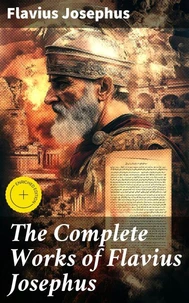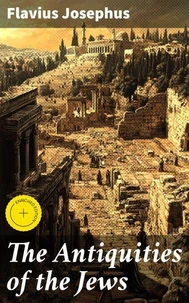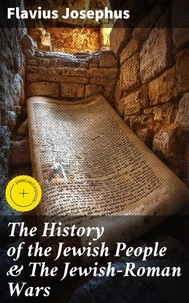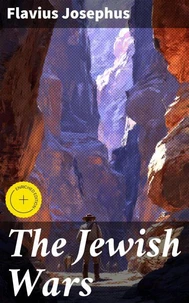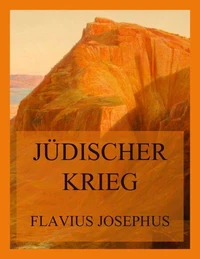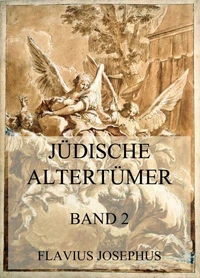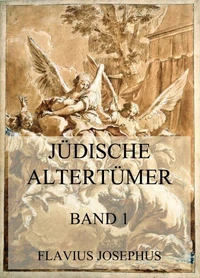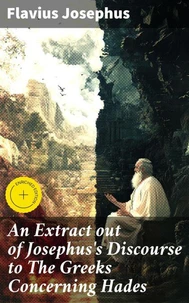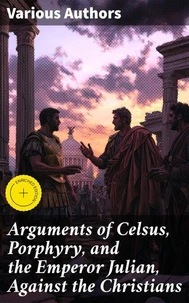The Wars of the Jews; Or, The History of the Destruction of Jerusalem
Par : ,Formats :
Disponible dans votre compte client Decitre ou Furet du Nord dès validation de votre commande. Le format ePub est :
- Compatible avec une lecture sur My Vivlio (smartphone, tablette, ordinateur)
- Compatible avec une lecture sur liseuses Vivlio
- Pour les liseuses autres que Vivlio, vous devez utiliser le logiciel Adobe Digital Edition. Non compatible avec la lecture sur les liseuses Kindle, Remarkable et Sony
 , qui est-ce ?
, qui est-ce ?Notre partenaire de plateforme de lecture numérique où vous retrouverez l'ensemble de vos ebooks gratuitement
Pour en savoir plus sur nos ebooks, consultez notre aide en ligne ici
- Nombre de pages529
- FormatePub
- ISBN859-65--4702185-8
- EAN8596547021858
- Date de parution28/05/2022
- Protection num.Digital Watermarking
- Taille904 Ko
- Infos supplémentairesepub
- ÉditeurDIGICAT
Résumé
In "The Wars of the Jews; Or, The History of the Destruction of Jerusalem, " Flavius Josephus intricately chronicles the turbulent events leading up to the fall of Jerusalem in 70 CE. This historical account is marked by Josephus's commitment to a detailed, eyewitness narrative style, which juxtaposes personal reflection with broader socio-political analysis. Written in the context of the Roman-Jewish War, the text serves both as a historical documentation and as a lamentation for a fallen culture, capturing the horrendous impact of the siege and the complexities of internal Jewish conflicts.
Josephus's writing is heavily influenced by his background as a Jewish priest and historian, blending elements of Greek historiography with Jewish religious thought, which makes it a pivotal work for understanding both Jewish history and the dynamics of imperial Rome. Flavius Josephus, born Yosef ben Matityahu, was a Jewish military leader and historian who ultimately surrendered to the Romans. His dual identity as a Jewish patriot and a Roman citizen afforded him unique insights into the events he recounts.
Josephus's experiences in the war and his later life in Rome shaped his narrative perspective, allowing him to remain both a chronicler of heroism and a witness to tragedy, enshrining the complexities of Jewish identity amid imperial conquest. This book stands as an essential resource for scholars, historians, and general readers alike, offering profound reflections on faith, survival, and cultural identity amid destruction.
Josephus's poignant prose invites readers to grapple with the human capacity for resilience in the face of overwhelming adversity, making it a compelling and relevant read for anyone seeking to understand the fragility of civilization.
Josephus's writing is heavily influenced by his background as a Jewish priest and historian, blending elements of Greek historiography with Jewish religious thought, which makes it a pivotal work for understanding both Jewish history and the dynamics of imperial Rome. Flavius Josephus, born Yosef ben Matityahu, was a Jewish military leader and historian who ultimately surrendered to the Romans. His dual identity as a Jewish patriot and a Roman citizen afforded him unique insights into the events he recounts.
Josephus's experiences in the war and his later life in Rome shaped his narrative perspective, allowing him to remain both a chronicler of heroism and a witness to tragedy, enshrining the complexities of Jewish identity amid imperial conquest. This book stands as an essential resource for scholars, historians, and general readers alike, offering profound reflections on faith, survival, and cultural identity amid destruction.
Josephus's poignant prose invites readers to grapple with the human capacity for resilience in the face of overwhelming adversity, making it a compelling and relevant read for anyone seeking to understand the fragility of civilization.
In "The Wars of the Jews; Or, The History of the Destruction of Jerusalem, " Flavius Josephus intricately chronicles the turbulent events leading up to the fall of Jerusalem in 70 CE. This historical account is marked by Josephus's commitment to a detailed, eyewitness narrative style, which juxtaposes personal reflection with broader socio-political analysis. Written in the context of the Roman-Jewish War, the text serves both as a historical documentation and as a lamentation for a fallen culture, capturing the horrendous impact of the siege and the complexities of internal Jewish conflicts.
Josephus's writing is heavily influenced by his background as a Jewish priest and historian, blending elements of Greek historiography with Jewish religious thought, which makes it a pivotal work for understanding both Jewish history and the dynamics of imperial Rome. Flavius Josephus, born Yosef ben Matityahu, was a Jewish military leader and historian who ultimately surrendered to the Romans. His dual identity as a Jewish patriot and a Roman citizen afforded him unique insights into the events he recounts.
Josephus's experiences in the war and his later life in Rome shaped his narrative perspective, allowing him to remain both a chronicler of heroism and a witness to tragedy, enshrining the complexities of Jewish identity amid imperial conquest. This book stands as an essential resource for scholars, historians, and general readers alike, offering profound reflections on faith, survival, and cultural identity amid destruction.
Josephus's poignant prose invites readers to grapple with the human capacity for resilience in the face of overwhelming adversity, making it a compelling and relevant read for anyone seeking to understand the fragility of civilization.
Josephus's writing is heavily influenced by his background as a Jewish priest and historian, blending elements of Greek historiography with Jewish religious thought, which makes it a pivotal work for understanding both Jewish history and the dynamics of imperial Rome. Flavius Josephus, born Yosef ben Matityahu, was a Jewish military leader and historian who ultimately surrendered to the Romans. His dual identity as a Jewish patriot and a Roman citizen afforded him unique insights into the events he recounts.
Josephus's experiences in the war and his later life in Rome shaped his narrative perspective, allowing him to remain both a chronicler of heroism and a witness to tragedy, enshrining the complexities of Jewish identity amid imperial conquest. This book stands as an essential resource for scholars, historians, and general readers alike, offering profound reflections on faith, survival, and cultural identity amid destruction.
Josephus's poignant prose invites readers to grapple with the human capacity for resilience in the face of overwhelming adversity, making it a compelling and relevant read for anyone seeking to understand the fragility of civilization.



